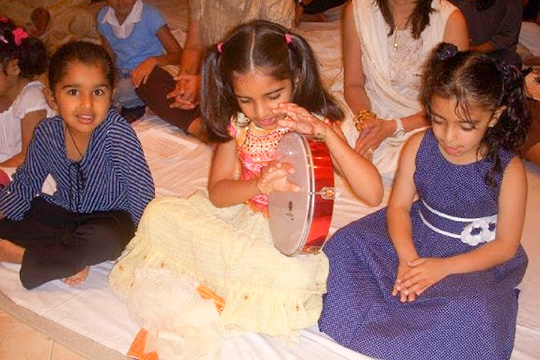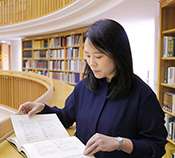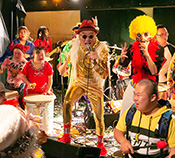Music is a Means to Spread the Message of Hope.
(Part 1)
Esha Alwani / Singer and songwriter
Accepting Tourette’s as a Part of My Identity.
Meet Esha Alwani from the Caribbean island of Aruba. Esha has Tourette syndrome, a genetic disorder she eclipses with a positive outlook and charm. She played music at the graduation ceremony of her junior high school, and it became a life-defining moment, convincing her to pursue life as a musician. She told us about the performance and how it shaped her destiny as an artist.
I started composing music like a person writing a diary.
Though I didn’t think much of the piano at first, the instrument has grown to become my very best friend. As a beginner, practicing was more of a grind than anything else. Then, over time, my Tourette syndrome awakened me to the importance of music in my life. I have lived with this neurodevelopmental disorder since I was a little girl. It kept me at home for years. The motor and vocal tics associated with Tourette syndrome made it difficult to attend school like other children. I was frustrated at times, blaming myself for failing to be normal. Then I found consolation in the piano. My symptoms, I discovered, subsided whenever I played. Gradually, I came to recognize how special and important music could be.
Music became the defining force in my life as I started writing songs. I had always liked writing poems and short stories. When I got my own guitar at age 12, I turned my passion to composing original songs and singing them to the instrument. I wrote songs about day-to-day events in my life, often about my experiences with Tourette’s, as if I was recording them in a diary. Composing was a refuge from the hardships of my life. In time I grew eager to present my songs to family and friends, which turned my focus to the messages I wanted to convey in my compositions. The process helped set the basis for what I express as an artist.

I was lucky to come to America, a place where I was encouraged to be open about my differences.
It took me many years to come to terms with Tourette’s. My big formative experience with the condition came in Florida, where I lived from age 10 to 14 to receive a specialist treatment. The treatment helped me better understand what triggered my tics and eased my anxieties about the condition. And as a person new to the country, I was astonished to see how much value Americans attached to individuality. The people in America were so diverse, being different became normal. The feeling of acceptance, the assurance that being different was okay, became part of who I was. No longer was I ashamed of my Tourette's.
The understanding of neurodevelopmental disorders is advanced in America, which made it possible for me to attend normal classes at school. There I formed close friendships and learned from committed and understanding teachers. I could openly talk with my friends and teachers about my disorder, my music, and other parts of myself without being judged.
The openness and accepting attitude in that environment helped me accept myself and gain self-confidence. By the time I finished junior high school, I had come to embrace Tourette’s as part of who I was.
I set my heart on becoming a musician.
As my confidence grew I came to a big turning point in my life. I was selected to perform on behalf of the class at the graduation ceremony of my junior high school. For the very first time I would have to perform in front of a large audience. And to add to the pressure, I decided to sing my own composition. Instead of taking the safe route and performing a song by somebody else, my teacher suggested that I take on the bolder challenge. I recognized my upcoming performance as an incredible opportunity. Soon I would stand on my feet and announce to the world that I accept Tourette’s as part of my life.
Before my performance I made a speech. I opened up to the people in front of me and spoke candidly about my challenges, what gave me hope, and how grateful I was for my school life in America. Many members of the audience knew nothing about me. The thought of how they would respond filled me with dread. But my fear turned out to be groundless. The performance went wonderfully, uninterrupted by tics. The music seemed to cast a powerful spell. When I finished singing, the audience were on their feet clapping their hands and cheering. In that moment I realized, with great exhilaration, that music was going to be my lifework. That was it; my heart was set. I was to become an artist who sent out positive messages through music to inspire.

- Esha Alwani / Singer and songwriter
- Born in Aruba, Esha Alwani creates her own music with the piano and guitar. Esha spent much of her childhood undergoing medical treatments for Tourette syndrome. She lived in Florida, USA for four years to receive specialist treatment, from age 10 to 14. There she performed her music on stage at the graduation ceremony of her junior high school. A record company discovered her performance on social media and contacted her to sign her on. Esha has released two albums so far: her debut album “Beautiful” in 2016 and “Dangerous” the next year. She currently majors in the music industry at Drexel University.
Interview Date:



